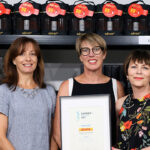New Zealand has just under half a million businesses with less than 20 employees1. We are a nation obsessed by business ownership. People launch (or buy) businesses for
a variety of reasons, but the wave of software start-ups over recent years, particularly in the mobile space, has made it all look deceptively easy.
Let’s get one fact absolutely clear – starting a business is not easy. I have that on good authority – the hundreds of business owners I’ve met over the past 14 years, and from my own experience. And then there are the failure stats – but we won’t go there.
There are, of course, countless articles about business start-ups and business growth, including those in this esteemed publication. If you’re looking for one of the best, check out Mark Loveys ten-part Garage to Global ‘how-to’ series on the NZBusiness website. (Part One is here: https://nzbusiness.co.nz/article/garage-global-10-steps-take-your-idea-world.)
Mark talks about the one ‘Big Idea’ as the genesis for any new start-up. As he says, it doesn’t necessarily need to be world-changing. “But it does need to be something that you are capable of executing well; that has
some kind of unique selling point (USP); that is useful to other people;
that people will pay good money for; and that can sustain and grow a successful business.”
Success is what we’re all aiming for, correct?
In the limited space available here, I’m going to pick up on one of Mark’s points – the USP – and another factor – mentoring – through two interesting start-up case studies.
Because case studies are where we learn from the mistakes and successes of others.
Hardware is hard
While not implying for a second that software start-ups are easy-street, nevertheless there is a saying within the start-up community that “hardware is hard”.
It’s a term Dan Bowden, co-founder and CEO of start-up O2O2, is familiar with.
His company has developed the next generation of pollution protection – patented smart-enabled clean-air masks featuring advanced air filtration technology.
In short, a USP like no other.
“Our hardest challenge is simply the nature of our product,” says Dan. “I regularly look on in envy at the software start-ups who can change a few lines of code and rollout a new product globally overnight.”
O2O2’s product is unique and involves long lead times, higher costs and complex supply lines, says Dan. “We address a silent killer; we require and have achieved independent testing of the product; we work from the nanoscale in New Zealand upwards – through to a physical product someone in Asia will wear partially as a fashion choice.”
In conjunction with AUT, O2O2 has proven the performance of the product and is now facing an equally challenging prospect of getting the product fit for market and finding the right channel partners.
“We potentially have some amazing channel partners in the wings and believe we can take a large proportion of the $10 billion-plus masks and respiration market,” says Dan.
O2O2 was the brainchild of fellow co-founders Jerry Mauger and Ilya Vensky, who had experienced air pollutants living in China and worked in a polluted workplace.
“Jerry felt that current solutions on the market to protect users were flawed and caused a host of user issues,” explains Dan. “He suspected that both performance and user issues could be addressed by fully utilising the properties of nanofiltration, co-developed with Revolution Fibres. It took
a lot of experimentation and failure, coupled with Kiwi ingenuity, but Jerry managed to completely flip the solution
on its head and in doing so came up with the foundations of what is now O2O2.”
The founders have a big vision for O2O2’s masks. But due to the fact that air pollution is not acute in this country, and therefore Kiwis struggle to grasp the problems being solved, the start-up immediately began reaching out to international contacts. This led to receiving seed investment from BMW and US venture capital fund SOSV.
“That opened the doors to the US Navy and investment from a Korean manufacturing giant,” says Dan. “I’m not sure we would have been moving so quickly if we had limited our ambitions to New Zealand.”
Planning has been the big lesson for this start-up. “We all know where the product can go, but if we try to do it all at once, we will never get there,” Dan explains. “So we need to clearly communicate how we are going to get there and not push the technology too hard in the initial steps.”
Lessons come hard and fast for start-ups, and Dan believes it’s important not to dwell on the past and the negatives – but learn from mistakes.
“We have had hundreds of learnings [along the way] – every day there seems to be something new,” he explains. “But failure and learning is the nature of life and of a good start-up.”
He says the stand-out lesson from the hundreds of lessons over the years would be the need for increased communication.
Mentoring makes it easier
If you’re serious about succeeding in business then you will have already engaged a business mentor. If you haven’t then you’re mixing with the minority.
You can learn a lot from a mentor – Business Mentors New Zealand has hundreds of examples of great partnerships to illustrate the benefits.
One involves mentor Chris Reid and fast-growing start-up NexGen Accounting – founded by brothers Niran and
Vinay Iswar.
It was Vinay’s idea to start an accounting business that offered a more personal service and could attract more value for customers. The brothers initially ran NexGen on the side. But after two years of working long into the evenings, they ditched their day jobs to focus fully on the business.
Niran had been introduced to BMNZ by a customer – he couldn’t see any downside and calls the low-cost programme a “no brainer” (clients of the Business Mentoring Programme pay a registration fee of $225 plus GST. After registration the mentoring is free for up to 12 months).
“I decided to practise what I preach, jumping on the opportunity to work with a mentor in the very early stages. I was put in touch with Chris Reid, who asked me to prepare some documents, including a financial forecast. The rest, as they say, is history,” says Niran.
Chris’s first impression of the brothers was that they were young, progressive, and keen to grow the business.
“They had a number of offerings for customers, from minor monthly activity to major monthly packages. Together we refined and reduced the offerings to ensure the best package was clearer to customers, before we could focus on growth,” says Chris.
He suggested the brothers join the Chamber of Commerce and attend some networking events. “Then the challenge was to make sure that they could deliver on their promises, as they were under-resourced in people who could provide experienced supervision. They needed to put a better structure in place and delegate the work more effectively,
so they no longer had to spend time interacting with every client directly.
“There were a few issues with putting the right team in place but after the move to their current office in Newmarket the problem was solved, and the company is now full of talented, young people.”
Chris says Niran and Vinay are both incredibly tech savvy, with a strong website and marketing strategy. “We have a meeting every month to review their numbers and look at what is going well and what needs working on. I set targets which I think they find useful.”
The growth opportunity for NexGen is significant, believes Chris, because everyone needs an accountant. “Their point of difference is their energetic and proactive approach. Many accountants only react to correspondence from the customer.
NexGen is always looking at how its customers can improve their performance, adding value rather than simply
crunching numbers.”
Progressing to the next level will continue to be all about hiring the right people, he believes. “Niran and Vinay need the right level of people beneath them, so they can focus on client delivery.”
The client perspective
When the Iswar brothers recruited their first employee – a graduate who went on to become a fully qualified accountant – they were grateful for Chris’s opinion, describing it as “integral to the decision-making process”. It continues to be the case when acquiring talent today – NexGen has grown to a team of 12 in three years.
Overall, Niran and Vinay’s expectations of the partnership centred on receiving advice from someone who’s been in business longer, and has experience over different industries.
“We also wanted guidance from someone who had faced the same growing pains as us,” says Niran. “You can sometimes
get disheartened during the early days of starting a business so it’s encouraging to have someone who can reinforce that you are doing well and going in the right direction.”
The concept of having someone hold them accountable was also very important, he adds.
Having a mentor has accelerated NexGen’s development from an accounting firm to a business advisory firm that specialises in growth. Niran says Chris was also invaluable in the decision to move the business to a new office, and in setting up a more profitable cost structure once credibility had been established with customers.
A final word
The two business examples covered here highlight the importance of having a strong USP and tapping into an experienced support structure. For start-ups there are numerous other ‘must haves’ too. A Google search will reveal many excellent sources of advice. In New Zealand, these include business.govt.nz, theicehouse.co.nz/startup-entrepreneurs, banks, the business development arm of local councils, and many more.
Above all – don’t forget to work on yourself. In New Zealand 21 percent of business owners rate themselves as the biggest obstacles to success; 26 percent lack confidence in growing their business; and 36 percent find business ownership isolating2.
Kia kaha – and the very best of luck!


